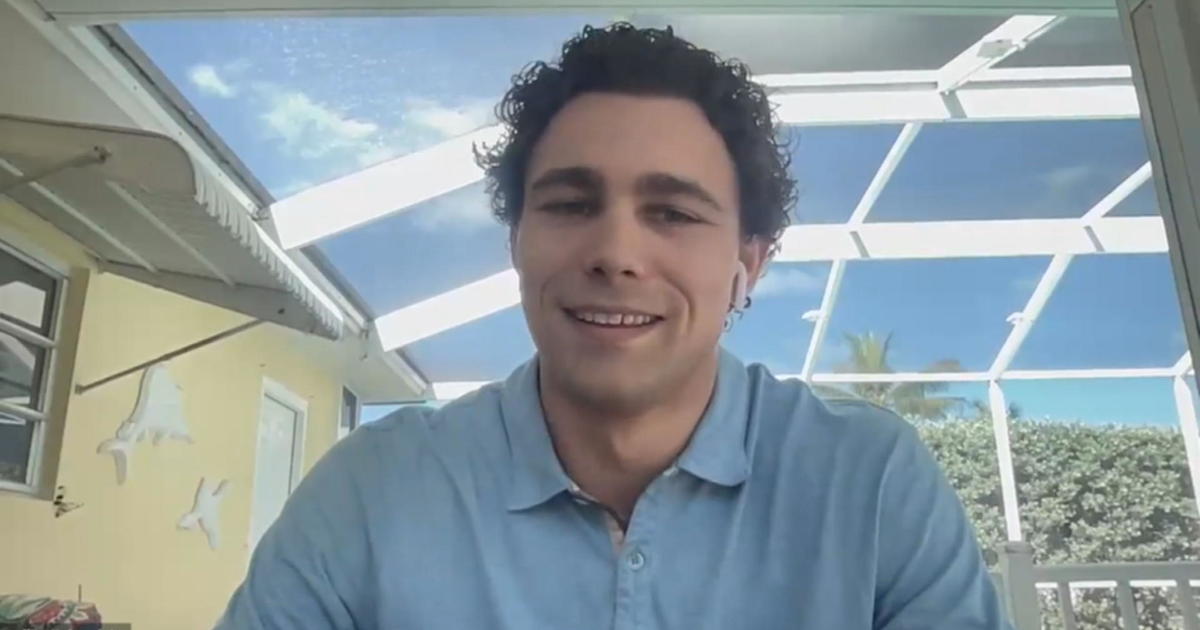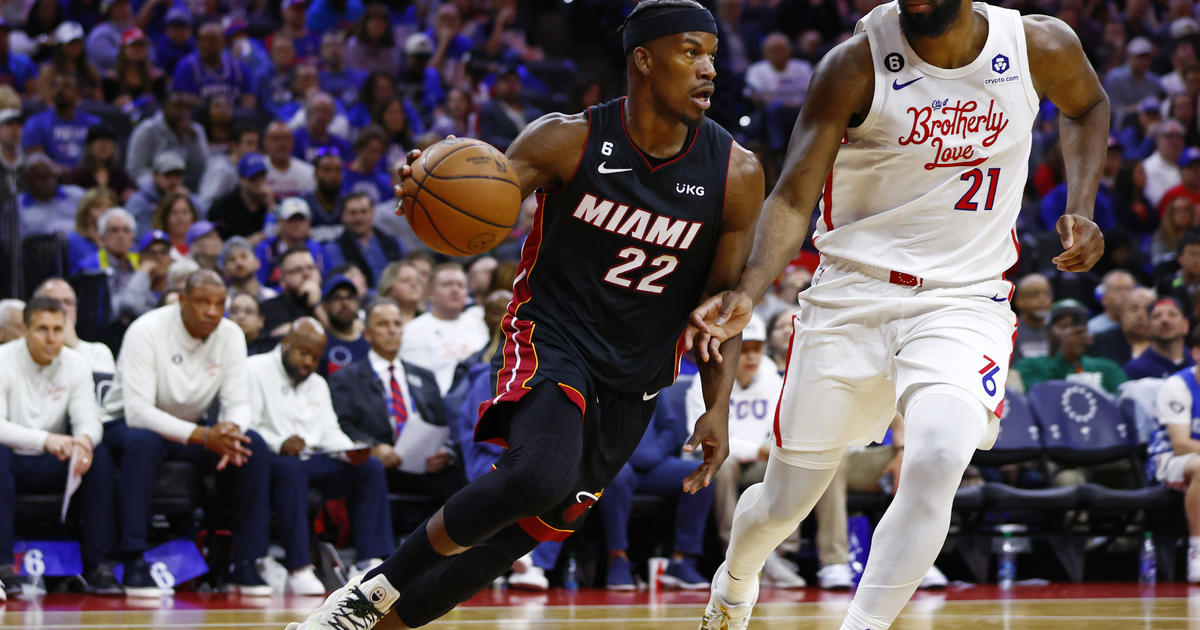Is Being Deaf Scaring Colleges Away From Pierce Phillips?
By Joseph Santoliquito/CBS Sports
PHILADELPHIA (CBS)—He steps into the batter's box. That open stance gives him a great view of the ball coming toward him. He looks strong at the plate, but then again, Pierce Phillips has always looked strong at the plate.
Seeing him there with his batting helmet tugged down tight just over his eyes, you couldn't tell. If you didn't know, you couldn't tell. Phillips fits neatly into everything, from his classes at Highland Regional (Blackwood, N.J), to the everyday social fabric of a high school student, to when he's playing second base for the Tartans.
If you didn't know, you'd have to pay close attention.
Phillips doesn't hear the beautiful metallic "ting" each time his bat connects with the ball. But he can tell by the strong vibration that courses through his hands and arms, and the vapor trail of the ball, that he's made good contact.
He can tell when he's rounding third base after a walk-off home run that wins a state playoff game by the line of fans along the cyclone fence with their hands waving up by their ears that he's done something memorable.
The surrounding world may be silent to Pierce. But he can tell what he does on a baseball field or in a classroom.
The 6-foot-1, 170-pound senior is a special baseball player. Perhaps made even more so by the fact that he's deaf.
He's never let it define him. He's never felt impaired by it. A three-year starter at second base, Phillips hit an astounding .507 as a junior last year, establishing a school record for hits in a season with 51 over 28 games. He then followed that up by going 13-for-17 in the postseason, which included a walk-off homer in a 4-for-4 playoff game against Lacey.
Pierce's parents, Steve and Patty, never deterred their son from anything. Pierce was born deaf, and instead of pouting about it, they acted. They enrolled Pierce in Marie H. Katzenbach School for the Deaf in Ewing, N.J., when he was 3 years old. Patty and Steve immersed themselves in the deaf culture, becoming fluent in sign language. Pierce was mainstreamed by third grade and he's attending Highland with the help of Jeannette Walden, his interpreter.
"I played sports growing up, I loved it, I had normal friends and I knew I was different, but it didn't bother me," said Pierce through his mother Patty. "I felt awkward talking to other people when I was younger, but I adjusted. I'd get some looks. But in time, everything came natural. I loved playing baseball and deck hockey. I love fishing. But I have to use my eyes all the time to pay attention to everything around me. My teammates all know that a fly ball close to second is mine and allow me to call them off."
This year, Pierce is hitting .425 and batting out of the third spot because Tartans coach D.J. Gore had to make some lineup adjustments due to injuries. He's already won one game with a two-run single against Kingsway, and he's carrying a 3.7 GPA and a 1,510 SAT score.
Pierce has been fortunate. His parents have always treated him as they would a hearing child. He's never encountered any ignorance by his peers, and teenagers can sometimes be cruel. Never with Pierce, whose warm smile and engaging personality have made him easily accepted by the Highland community.
He possesses the skills and grades to play for a variety of college programs, and this is where the Phillips family has encountered some ignorance. It's the kind of myopic attitude that prevented Major League scouts from going after African-American high school stars in the 1930s and '40s. Following the clippings of a certain player, scouts would suddenly peel off once they found out the player that they were interested in was black.
Pierce, feels Patty and Steve, is enduring the same reluctance. He's an exceptional fielder. He can certainly hit. He has sound grades. He's able to socially adapt to anything. And at a lean 6-1, 170, he's only going to get bigger and stronger. Yet when he's been invited to college camps or if a college coach inquires about him, once they find out he's deaf, some have suddenly changed their minds, saying, "We have enough second basemen" … or … "He may not fulfill our needs."
He's worked his whole life for the crowned jewel-a college baseball scholarship. So what's the issue?
"That's what we're wondering," says his father Steve, rolling his eyes in frustration. "I've tried to look at it not as a parent as much as I could. The grades are there, the ability is there. But when you see things like the time he worked out for a Delaware school, they just blew him off. It makes you wonder. I don't think it comes from the schools themselves, it comes from the coaches of these schools. It is frustrating knowing coach Gore has hardly received any calls from colleges about Pierce.
"Pierce can play at a lot of places, and there is an ignorance out there. He's never been babied in his life. He doesn't think of himself as handicapped and no different than anyone else. You just want what's best for your child, and to be treated equally. But thank God for Pierce. His attitude and personality are getting me and my wife through this."
Patty gets a little emotional about her son's college status. She works with hearing-impaired children, and witnesses some of the things they endure every day. There's been some crying, she admits, "because you want what's fair," Patty said.
"I work with deaf children all day and I see sometimes they're not given the same amount of respect as a hearing child. Pierce has earned the right to play baseball in college. He's been able to show other children who are deaf that they shouldn't feel limited. It's how Steve and I wanted to raise Pierce."
Rutgers-Camden, along with Division II West Chester and Chestnut Hill College, have shown Pierce interest.
Chestnut Hill baseball coach Bob Spratt spent three years as Chestnut Hill's Director of Student Services and in addition to that was the head of the school's disability committee, in charge of making accommodations for any student in need of special assistance. He'd see students and students with disabilities every day in his office and couldn't tell them apart.
Spratt began the baseball program at the small Catholic college located in the Chestnut Hill section of Philadelphia in 2007. He's willing to recruit the best players possible to grow the program.
"We recruit the best student/athlete out there that fits our needs, and hope that we can fit the needs of the student/athlete," Spratt said. "It obviously would be a challenge to coach a handicapped player, but it's a challenge we would certainly welcome. You have to start with creating communications from coach to player, player to coach, and player to player. If it's presented as a detriment, it will be a detriment. If it's presented as something positive, it will be positive. It's a collective agreement between the coach and the team, and I would welcome that challenge. It's something that can be dealt with."
This is a special time of year for Highland. The Tartans are taking aim once again at the South Jersey Group 3 playoffs, and hopefully, the same magic Pierce had in his bat this time last year will resurface. He'll likely have more than 100 hits by the time he finishes his career, becoming the third player in Highland history to do so. Pierce hit at such a torrid pace last year that opposing teams are pitching around him now.
"Pierce's disability, if you want to call it that, I kind of relate it to a superhero," Gore said. "Pierce doesn't have one function, but everything else is heightened around him. He's able to see things that other people can't, because he's more focused. He has to be. He hits bad pitching, he hits average pitching, and really excels against good pitching, which is all we saw in last year's playoffs."
Gore wants to see Pierce wind up at a quality college, and feels he's good enough to earn a baseball scholarship. He's seen situations at showcases when college scouts loved watching him play, and Gore has no doubt that eventually some lucky school will land Pierce — because there is a factor most coaches or opposing players can't see in Pierce Phillips.
"You can't judge this kid's heart," Gore said. "Pierce can play anywhere in college, and it's a shame, because I think he has been a little defined by people who haven't taken the time to know him. He's been able to define us as a program and who we are. Every time he plays, he gains two or three new fans. He's really what high school sports is all about."



